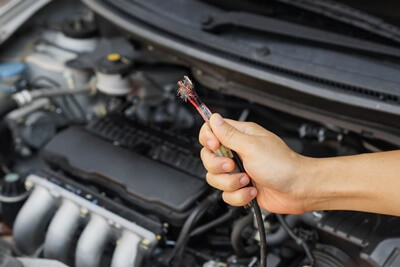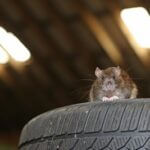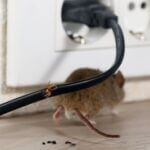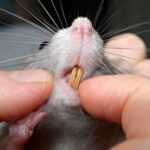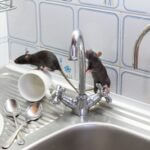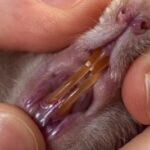Rodent-inflicted damage to cars is a major concern for many vehicle owners, especially during the winter.
As rats seek shelter inside vehicles to escape the cold weather, they often chew wires and vehicle components, which causes system malfunctions.
To stop rats chewing car wires, keep your car running regularly and use natural repellents. Also, park your car in a sealed garage, leave your car’s hood up at night, and install wire mesh over entry points.
Don’t leave any food sources inside your car, including leftover food containers.
No matter how reliable or resilient your car is, you should never underestimate the ability of rats to chew wires and cause damage to your vehicle.
Why Do Rats Chew Car Wires?
Rats chew anything they can find in their environment, including car wires.
According to Lab Animal, rats have open-rooted dentition, which means their teeth grow continuously throughout their lives.
Their sharp incisors are located at the front of their upper and lower jaws. These typically grow at an angle and a much quicker rate.
If left unchecked, the overgrowth of these incisors can lead to malocclusion (misalignment of teeth). This makes it difficult for rodents to close their mouths.
To avoid this, rats have to constantly gnaw at objects, enabling them to wear down their teeth and maintain a proper dentition.
Car wires are a particularly favorite target for rats. After all, their round shape makes it easier for rats to hold them with their paws while gnawing.
Additionally, car wires are located inside components or car parts that produce heat. These include the engine compartments and AC systems.
This makes them good sites for nest-building as rats are assured of warm shelter in wire-ridden locations.
Can Rats Destroy Car Wires?
Rats are notorious for chewing wires of all kinds, and car wires are no exception.
According to PLoS One, rats have strong jaws that can deliver powerful bites on even the hardest materials, including the metals that car wiring is made of.
When rats gain access to car wiring, they’ll gnaw at the wires until they split open or break. This can cause car components (such as the engine, display screen, and air conditioning system) to malfunction. This creates a risk for accidents that can put the lives of drivers and other road users in danger.
Rats sometimes bite down the insulation material on wires, thus leaving them exposed. This increases fire risk since the exposed wires can spark when electrical currents are passed through them.
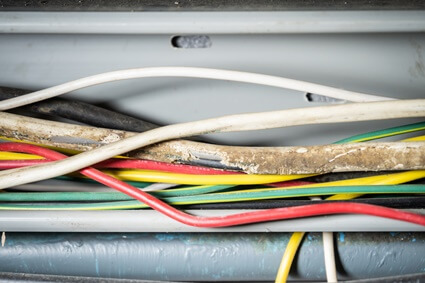
How To Tell If Rats Are Chewing Car Wires
If you notice teeth marks or punctures about 1.5 mm wide, the wires have been chewed by rats.
As highlighted, damage caused to car wires by rats can lead to various components of your car malfunctioning.
So, if your engine is suddenly failing more often or your electrical display stops working out of the blue, it may be because rats have damaged your car wires.
There are less obvious signs that indicate rats have been in contact with your car wires but opted not to settle there.
For instance, you might find your car wires are covered with urine stains and droppings or notice a bad odor emanating from your hood.
If you notice any of these signs, act fast to prevent rats chewing wires. Otherwise, they could cause hundreds or thousands of dollars worth of damage to your car.
What Is The Cost of Rodent Damage To Car Wiring?
Rodent damage to car wiring can cost between $700 and $2,000, depending on the severity.
You may still be able to use your car if the damage inflicted on your wiring isn’t severe. However, extreme cases may render your vehicle inoperable.
Most comprehensive vehicle insurance policies cover repair costs for wiring damage caused by rodents. Review your insurance policy to determine what kind of damage is covered.
How To Protect Car Wires from Rats
Here are the most effective ways to protect your car wires from rats:
Wire Mesh Over Entry Points
Rats are flexible creatures that can squeeze through the tiniest of spaces.
Any opening larger than a nickel can be a gateway for rats to enter your car and wreak havoc on your wiring. So, you need to install a physical barrier to keep them away from any wiring.
Inspect your car for rodent entry points, such as air vents, gaps around the steering column, and hood scoops. Then, hire a technician to install wire mesh over these components.
Since rats can’t chew through wire mesh, they won’t be able to access the wiring, even if they manage to get inside your car.
Remove Nesting Material
Rats are intelligent and opportunistic creatures that make nests from the most basic materials.
If you leave newspapers, cardboard boxes, or food wrappers inside your car, you may be unwittingly providing a source of nesting material for rats.
So, de-clutter your car and get rid of any items that rats may use for nesting.
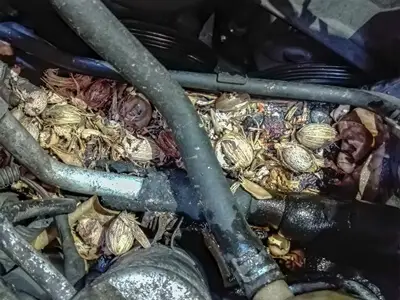
Natural Repellents
Peppermint oil has a strong scent that rats hate.
To use peppermint oil, douse several cotton balls with a few drops of peppermint oil and place them in all the areas in your car where there is delicate wiring.
Next, close the doors, trunk, and engine compartment of your car and roll up your windows.
This way, the strong aroma of peppermint diffuses throughout your car without evaporating into the air. The potent scent of peppermint will make your car inhospitable to rats.
Other natural alternatives include mothballs, vinegar, and citronella oil.
Remove Food Waste
If you eat in your car, any food waste may attract rats looking for a meal.
For this reason, always get rid of any food remnants and wrappers after eating. Also, clean out any food debris and crumbs that dropped while eating.
Park The Car in A Safe Location
Rats are more likely to enter your car and chew wires if parked in an area with rats. So, always park your vehicle indoors if you have access to a closed garage.
Run Your Car Regularly
Leaving your car unattended for prolonged periods can be an inviting shelter for rats. To discourage rats from sheltering inside your car, keep it running regularly.
Even if you don’t intend to drive your car, starting your engine and honking the horn will scare off any rats inside and outside your car.
Leave Hood Open At Night
Rats are likely to enter your vehicle if they suspect no one is nearby.
Consequently, leaving the hood of your car open at night when you go to sleep tricks rats into thinking that the environment is unsafe.
The cost of rodent wiring damage can be considerable. So, it’s better to take the preventative measures outlined to minimize the risk of damage occurring.

